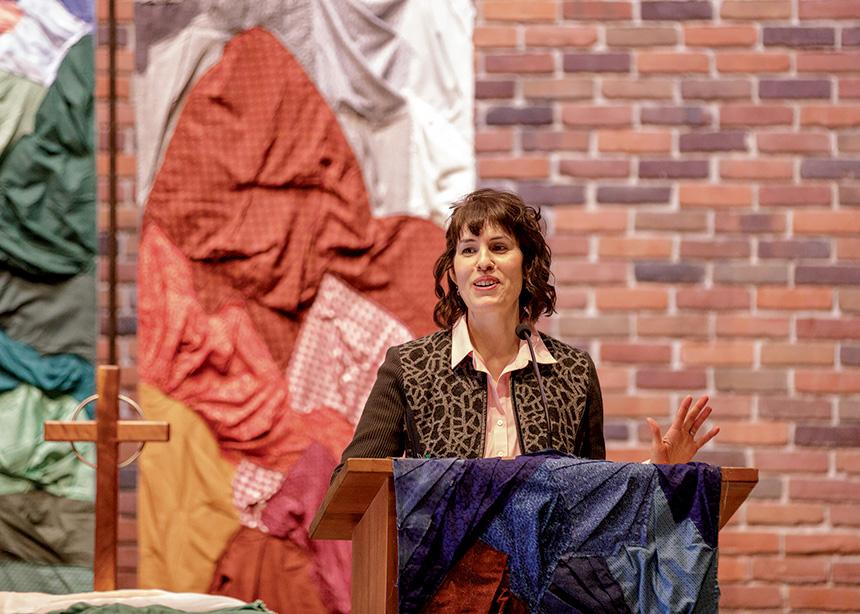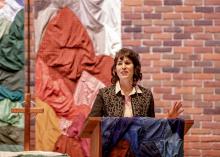A new book aims to help Christians process collective traumas.
In All Our Griefs to Bear, seminary professor Joni S. Sancken suggests practices that church leaders and members can use to nurture resilience and compassion as they work through the traumas they face, including the pandemic.
The book, published last November by Herald Press, is a follow-up to Words That Heal, a 2019 book in which Sancken explores preaching as a way to engage with trauma. That book was inspired in part by the death of her sister-in-law, who died unexpectedly at the age of 34 following a brain aneurysm.
Sancken, an ordained pastor in Mennonite Church USA, decided to write All Our Griefs to Bear following a series of traumatic events in Dayton, Ohio, where she teaches at United Theological Seminary. These events included 19 tornados, a Ku Klux Klan rally and a mass shooting that claimed the lives of nine people.
The pandemic provided additional impetus.
“Now we have a situation where everyone, to some extent, has experienced traumatic stress,” Sancken tells Canadian Mennonite. “What does that mean for society and for our congregations? How do we begin to instill practices that will help to build resilient communities?”
In the book, Sancken defines trauma as “circumstances in which one’s own life or the life of a loved one is under threat, where one loses a loved one suddenly, or when the ability to process the experience is exceeded by the magnitude of the experience itself.”
Put another way, trauma is “too much, too fast, too soon.”
“It really is a full experience,” Sancken says. “It impacts you spiritually, mentally, socially, physically—all parts are touched by the traumatic experience.”
The good news, she adds, is that most people are able to nurture resilience and move forward in a healthy way. It’s the folks who get stuck following traumatic experiences who need extra care.
Racial trauma and economic insecurity are two of the griefs Sancken touches on.
“When I was writing this book, it was like a parade of horrible trauma,” she says, pointing to numerous mass shootings in the U.S., the discovery of unmarked graves at the former Kamloops Indian Residential School and the war in Ukraine as examples. “We have to find ways to work through that.”
To that end, Sancken suggests three practices to use in processing trauma: lament, storytelling and blessing.
The practices arose during her training with the Strategies for Trauma Awareness and Resilience through the Center for Justice and Peacebuilding at Eastern Mennonite University in Harrisonburg, Va.
Sancken defines lament, storytelling and blessing, explores the cultural baggage surrounding each practice, and gives concrete examples of how Christians can practice them during worship and in everyday life.
One of the biggest things Sancken has learned from working with trauma is that when anything in the world is hurting, it is OK to feel distressed.
“That is not something that I should purposefully numb out or squelch or avoid, but rather I should allow myself to feel that and then do something with intention toward that,” she says.
It could be something symbolic like lighting a candle, or it could be saying a prayer, making a donation or going into the street and protesting. “[Traumatic] things happen all the time. All the time we experience these kinds of reverberations of the suffering of creation.”
Sancken stresses that All Our Griefs to Bear is not a one-size-fits-all road map. Lament, storytelling and blessing can be practiced in any order, and there are no “shoulds” when responding to trauma.
“I’m interested to see how churches will adapt and build on this material,” she says. “If people find anything that is beneficial to their own healing and resilience journey, then … [the book] will have mattered.”





Add new comment
Canadian Mennonite invites comments and encourages constructive discussion about our content. Actual full names (first and last) are required. Comments are moderated and may be edited. They will not appear online until approved and will be posted during business hours. Some comments may be reproduced in print.